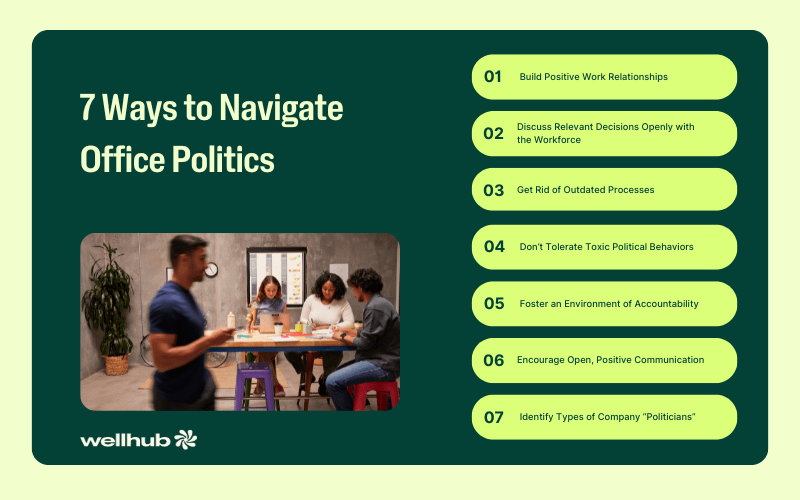7 Helpful Tips for How to Navigate Office Politics
Last Updated Jan 28, 2025

Office politics might not be listed on your company’s org chart, but its impact is real. Whether it’s navigating power dynamics, managing workplace alliances, or dealing with hidden agendas, office politics can influence everything from team morale to employee retention. As an HR leader, understanding these dynamics is essential to keeping your workplace healthy and productive.
The good news is that you can discover how to deal with office politics effectively, helping others advance their careers and build meaningful relationships without any drama. The key? Creating an environment of transparency, fairness, and open communication that minimizes toxic behaviors and promotes genuine teamwork.
Leveraging these tips can help to address office politics and create a thriving organizational culture!
What Are Office Politics?
Office politics refer to the informal, and often behind-the-scenes, interactions and power dynamics within a workplace that influence decisions, relationships, and opportunities. These dynamics often revolve around issues like power, authority, and alliances between employees and leaders.
Office politics can be both positive and negative. On the positive side, understanding office politics can help you navigate relationships, build alliances, and achieve your goals within an organization. On the negative side, it can lead to favoritism, exclusion, or conflicts that harm team morale and productivity.
For HR leaders, navigating this landscape is crucial. By fostering a culture of transparency and inclusion, you can diffuse the negative impact of office politics and channel it into healthy competition and collaboration. This approach minimizes harmful effects like turnover and disengagement while strengthening the overall work environment, driving both team cohesion and business success.
How Office Politics Affect the Workplace
Office politics are a natural result of human interactions and how organizations are structured. They often show up when different stakeholders—whether investors, leaders, or employees—clash over the company’s vision, creating tension and uncertainty. You’ll often notice office politics surface in areas like career advancement, resource allocation, organizational culture, or the push to stay competitive.
When channeled positively, office politics can spark advocacy for great ideas and drive meaningful change. But when left unchecked, negative politics can drain the energy out of a workplace, slowing productivity and straining relationships. This can lead to:
- Lack of trust
- Unhealthy competition
- Reduced collaboration
- Decreased morale
- Increased stress and burnout
- High employee turnover
- Poor communication
Getting ahead of office politics starts with a strong organizational development strategy. By shaping your company’s structure and crafting a thoughtful employee development plan, you give your team the tools to resolve conflicts and grow—both individually and as a unit. When the inevitable workplace politics arise, those healthy skills can be the key to turning potential friction into collaboration and progress.
7 Tips to Navigate Office Politics
No organization is free from office politics, but you can help employees and company leaders foster a positive environment with any of these actionable ideas.

Tip 1: Build Positive Work Relationships
First and foremost, you can unify your workforce by promoting healthy and supportive work relationships. This fosters trust, boosts collaboration, and—best of all—diminishes unhealthy competition and jealousy. When people trust each other, their differences of opinion can lead to growth and problem-solving, not contention. This ultimately helps them establish a network of allies who support them and provide valuable insights.
Company bonding activities are a great place to start — people can get to know each other outside of a corporate setting and connect as people, not just coworkers. Humanizing one another and enjoying each other's company bleeds into the work setting, too. Encouraging cross-functional projects and having open communication channels at work are also useful. Employees who have strong relationships are more likely to resolve conflicts directly and avoid engaging in negative office politics.
Tip 2: Discuss Relevant Decisions Openly with the Workforce
Lack of transparency around company-wide decisions can leave employees feeling confused and disconnected, often fueling negative office dynamics. You can close that gap by practicing open, honest communication and actively seeking employee input. This transparency reduces speculation and mistrust—key drivers of office politics.
When organizations truly listen to employees, they give space to voices that not only deserve to be heard but can offer fresh, nuanced perspectives. This can help avoid issues arising from lack of communication, such as managers who isolate themselves from their employees or engage engaging with specific employees over others — a surefire breeding ground for resentment and disengagement.
While it’s natural for leaders at the executive level to have private discussions, regular meetings with the broader workforce to share what decisions are being made and why can provide the transparency that builds trust across all levels. Consider talking openly about goals, challenges, and other company-wide issues whenever possible.
Tip 3: Get Rid of Outdated Processes
Take a look at your company’s current organizational structure and see where it may be failing your employees, especially when it comes to diversity and inclusion. Some minority groups may especially suffer from outdated processes that favor specific groups with social power.
For example, informal mentorship programs or networking events often benefit employees who already have connections with leadership, leaving others at a disadvantage. This could be especially damaging if those leaders have unconscious biases and exclude minority groups — which can even lead to discrimination. These processes lack transparency and rely on favoritism, making it harder for underrepresented employees to access growth opportunities.
You can talk with members of your organization to see what is working and what isn’t. You may not see certain processes as outdated, butwith meetings, feedback sessions, and company surveys, your coworkers may shed some light on blindspots.
HR managers can also regularly review and update policies and procedures to ensure they are fair and align with the organization's values. By modernizing processes and conducting organizational development interventions when relevant, HR can help minimize opportunities for manipulation or favoritism.
Tip 4: Don’t Tolerate Toxic Political Behaviors
Setting expectations is everything, and it’s up to HR to create a zero-tolerance policy for any negative behaviors like manipulation, sabotage, or harassment. It’s important to hold perpetrators of such negative political behaviors accountable for their actions by clearly communicating expectations and consequences to employees. When issues arise, promptly address any reported incidents and reinforce the company’s stance on such scenarios.
Personal agendas, especially those driven by unethical tactics, should also be discouraged. HR plays a key role in identifying these behaviors and ensuring they are not rewarded, even if they appear to contribute to company success. For example, if a sales team uses shady tactics to boost their own commissions, that behavior undermines trust and is not a true “win” for the company. Consistent policy enforcement discourages behaviors like this and ultimately creates a healthier work environment.
Tip 5: Foster an Environment of Accountability
Leading by example can help turn your company into one of accountability and recognition. Setting clear expectations and establishing measurable goals can help employees recognize their contributions and guide them toward development and promotion opportunities. When employees are accountable for their actions and outcomes, they are less likely to resort to office politics as a means of advancement or protection.
Perhaps even more importantly, managers and other leaders can be held accountable for their actions and team policies. No one is exempt from taking ownership of their successes and failures, and it starts with the people in charge.
Tip 6: Encourage Open, Positive Communication
It’s important to create channels for transparent and constructive feedback in any organization, in the office or virtually. This can include regular team meetings and feedback mechanisms, like anonymous suggestion boxes.
Encouraging employees to voice their concerns and provide feedback helps address potential issues before they escalate into political battles. This is a simple but impactful way to make every employee feel respected and heard while building greater trust.
Tip 7: Identify Different Types of Company “Politicians”
You may find certain office politician archetypes that misuse their authority or create conflict. HR can help eliminate the following behaviors and tendencies within the organization, especially those in management positions who can do the most harm.
The Gossiper
The office gossip is not only unprofessional, it’s also unproductive. And even managers can get in their own team’s way with this type of politicking: one study found that 30% of professionals reported their superior sought out gossip to understand the workplace better. This, of course, never helps — hurting someone’s reputation or spreading rumors only hinders the creativity and potential of your company.
Implementing a zero-tolerance policy towards gossip can help curb this behavior. HR can regularly communicate the importance of maintaining a respectful and professional environment — and lead by example. This includes offering training sessions on effective communication and conflict resolution.
The Bully
An office bully is an individual who uses aggressive tactics, intimidation, or harassment to assert power and control over others. It’s best to establish a zero-tolerance policy for harassment of any kind.
You can help by making the reporting process simple to follow and providing training to set the standard. As always, managers and HR can demonstrate respectful and inclusive behavior, setting the tone for the organization. HR can help by making the reporting process for bullying incidents as straightforward and accessible as possible so that employees feel safe to come forward.
The Climber
Social climbers are people who only care about their personal advancement and are willing to use manipulative and unethical tactics to get ahead. They are rarely satisfied with their current position and use their power and influence on others to gain even more control and influence.
Consider promoting teamwork over individualism in your company values and encourage personal development instead of only promotion. This can be reinforced through performance reviews that assess individual accomplishments and contributions to team success.
The Lobbyist
A lobbyist is someone who uses behind-the-scenes maneuvering and persuasion to influence decision-makers for their gain or agenda. Encourage direct conflict resolution and communication, in addition to training coworkers how to constructively provide feedback and opinions.
This helps everyone know how to properly disclose a conflict of interest if the situation calls for it. It also leads to employees understanding the importance of integrity and ethical behavior in their decision-making processes.
The Exploiter
These individuals take advantage of others, especially by using them for their ideas or work and not giving any due credit or compensation. You can discourage these behaviors by promoting a culture of recognition.
This can look like rewarding people for appreciating others, which places value on collective success over individual success. It could also help to establish clear guidelines on intellectual property and credit-sharing within your company.
Protect the Social Wellness of Your Organization with Wellhub
Taking care of your employees is one of the most effective ways to create a resilient and safe culture that doesn’t fall prey to damaging office politics.
What can HR do now to create a culture of trust and collaboration? It can start with advocating for the health and wellness of your employees. Employees who are happy with their work-life are not as likely to engage in toxic office politics, and 100% of HR leaders say wellness programs are important to employee satisfaction.
You don’t have to figure out your wellness program on your own, either. Wellhub is an employee wellbeing program that provides all kinds of resources for you and your employees. It helps HR leaders promote a healthy work environment and prioritize wellness for their coworkers. Speak with a Wellbeing Specialist today to learn more about corporate wellness!

Company healthcare costs drop by up to 35% with Wellhub*
See how we can help you reduce your healthcare spending.
[*] Based on proprietary research comparing healthcare costs of active Wellhub users to non-users.
You May Like:
- Create a Thriving Organizational Culture
- How Workplace Culture Affects Employee Morale and Productivity
- Six Tips for Navigating Workplace Gossip to Create a Positive Environment
References
- Wellhub (2024, May 16). Return on Wellbeing 2024. Retrieved August 16, 2024 from https://wellhub.com/en-us/resources/research/return-on-wellbeing-2024/
- Workplace Gossip: Everything You Need to Know. Human Capital Hub. August 16, 2024 from https://www.thehumancapitalhub.com/articles/workplace-gossip-everything-you-need-to-know
Category
Share

The Wellhub Editorial Team empowers HR leaders to support worker wellbeing. Our original research, trend analyses, and helpful how-tos provide the tools they need to improve workforce wellness in today's fast-shifting professional landscape.
Subscribe
Our weekly newsletter is your source of education and inspiration to help you create a corporate wellness program that actually matters.
Subscribe
Our weekly newsletter is your source of education and inspiration to help you create a corporate wellness program that actually matters.
You May Also Like

How to Build a Strong Company Culture: Examples & Best Practices | Wellhub
Discover how an effective company culture shapes an environment that builds employee success, growth, and engagement culture.

How to Build a Thriving Organizational Culture | Wellhub
Organizational culture is used to define values, norms and behaviors of employees. Learn how you can develop a positive organizational culture.

How to Write a Memo: Format, Template, Best Practices | Wellhub
Discover key elements and best practices to master memo writing. Learn the power of effective communication now!